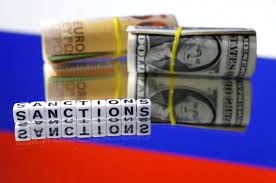
Despite stringent sanctions from the U.S. and EU following its invasion of Ukraine, Russia has successfully imported around $2.3 billion in dollar and euro banknotes since March 2022, according to customs data reviewed by Reuters. These figures highlight Russia's ability to bypass sanctions aimed at restricting its access to hard currencies, which remain vital for trade and travel.
The data reveals that Russia sourced cash from countries such as the UAE and Turkey, which have not imposed trade restrictions. The origin of over half the total amount remains unspecified, underscoring the opacity surrounding these transactions.
In response to potential sanctions evasion, the U.S. government has warned financial institutions of penalties for aiding Russia and has already sanctioned companies from third countries. Meanwhile, the Chinese yuan has overtaken the dollar as the most traded foreign currency in Moscow, although payment challenges persist.
Despite efforts by Moscow to reduce its reliance on hard currencies, foreign currency remains in demand among Russians for travel, small imports, and savings. Dmitry Polevoy, head of investment at Astra Asset Management, remarked, "For individuals, the dollar is still a reliable currency."
Russia's central bank, in a move to support the weakening rouble, restricted foreign currency cash withdrawals after the invasion. From February 2022 to the end of 2023, only $98 million in dollar and euro banknotes were exported from Russia, while inflows were significantly higher.
Aero-Trade, a lesser-known company providing duty-free shopping services, emerged as the largest declarant of foreign currency, declaring about $1.5 billion in cash during this period. However, Aero-Trade's owner, Artem Martynyuk, questioned the authenticity of the customs records, stating that "Aero-Trade is not engaged in the supply of hard currency to Russia."
Interestingly, the customs data also points to a surge in cash imports just before the invasion, with $18.9 billion in dollar and euro banknotes entering Russia between November 2021 and February 2022, compared to just $17 million in the previous four months. Daniel Pickard, an expert in international trade and national security, suggested this spike indicated an attempt by Russians to shield themselves from potential sanctions.
The documents further reveal that over a quarter of the $2.3 billion in banknotes was imported by Russian banks, often in exchange for precious metals. For instance, Vitabank, a Russian lender, imported $64.8 million in banknotes from Turkish gold trading firm Demas Kuyumculuk, while exporting $59.5 million in gold and silver to the same company.
This cash-for-gold trade highlights how Russia, cut off from the Western financial system, has turned to alternative means to settle international payments. The Turkish gold trader involved emphasized compliance with all regulations, noting that the two-way trades ended after fulfilling pre-war contracts.
Among other significant cash importers were entities controlled by Rostec, a state-owned military-industrial conglomerate under U.S. sanctions since 2014. The implications of these findings point to Russia's resilience in maintaining financial operations despite being largely excluded from the Western financial system.
(Source:www.reuters.com)
The data reveals that Russia sourced cash from countries such as the UAE and Turkey, which have not imposed trade restrictions. The origin of over half the total amount remains unspecified, underscoring the opacity surrounding these transactions.
In response to potential sanctions evasion, the U.S. government has warned financial institutions of penalties for aiding Russia and has already sanctioned companies from third countries. Meanwhile, the Chinese yuan has overtaken the dollar as the most traded foreign currency in Moscow, although payment challenges persist.
Despite efforts by Moscow to reduce its reliance on hard currencies, foreign currency remains in demand among Russians for travel, small imports, and savings. Dmitry Polevoy, head of investment at Astra Asset Management, remarked, "For individuals, the dollar is still a reliable currency."
Russia's central bank, in a move to support the weakening rouble, restricted foreign currency cash withdrawals after the invasion. From February 2022 to the end of 2023, only $98 million in dollar and euro banknotes were exported from Russia, while inflows were significantly higher.
Aero-Trade, a lesser-known company providing duty-free shopping services, emerged as the largest declarant of foreign currency, declaring about $1.5 billion in cash during this period. However, Aero-Trade's owner, Artem Martynyuk, questioned the authenticity of the customs records, stating that "Aero-Trade is not engaged in the supply of hard currency to Russia."
Interestingly, the customs data also points to a surge in cash imports just before the invasion, with $18.9 billion in dollar and euro banknotes entering Russia between November 2021 and February 2022, compared to just $17 million in the previous four months. Daniel Pickard, an expert in international trade and national security, suggested this spike indicated an attempt by Russians to shield themselves from potential sanctions.
The documents further reveal that over a quarter of the $2.3 billion in banknotes was imported by Russian banks, often in exchange for precious metals. For instance, Vitabank, a Russian lender, imported $64.8 million in banknotes from Turkish gold trading firm Demas Kuyumculuk, while exporting $59.5 million in gold and silver to the same company.
This cash-for-gold trade highlights how Russia, cut off from the Western financial system, has turned to alternative means to settle international payments. The Turkish gold trader involved emphasized compliance with all regulations, noting that the two-way trades ended after fulfilling pre-war contracts.
Among other significant cash importers were entities controlled by Rostec, a state-owned military-industrial conglomerate under U.S. sanctions since 2014. The implications of these findings point to Russia's resilience in maintaining financial operations despite being largely excluded from the Western financial system.
(Source:www.reuters.com)














